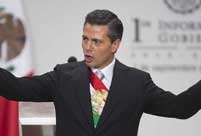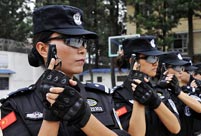 China's new-type guided missile frigate 'Bengbu' in live fire training
China's new-type guided missile frigate 'Bengbu' in live fire training
 China’s weekly story (2013.8.10 - 8.23)
China’s weekly story (2013.8.10 - 8.23)
 Flight team performs first show abroad
Flight team performs first show abroad
 With parents bedridden, 12-year-old boy becomes pillar of the family
With parents bedridden, 12-year-old boy becomes pillar of the family
 Top 10 private Chinese enterprises 2013
Top 10 private Chinese enterprises 2013
 The most gorgeous Chinese women in the eyes of foreigners
The most gorgeous Chinese women in the eyes of foreigners
BEIJING, Sept. 5 -- The U.S. Senate Foreign Relations Committee on Wednesday passed a resolution to authorize a military strike against Syria amid continuous calls from international community for political solutions.
The panel voted 10-7 to pass the resolution with Senator Edward Markey voting present, clearing the way for a full Senate vote which is likely to take place next week.
However, the vote showed deep division inside the Senate, as the resolution was greeted with both bipartisan support and bipartisan opposition.
Three Republicans, John McCain, Bob Corker and Jeff Flake, voted yes with seven Democrats. Two Democrats, Tom Udall and Chris Murphy, rejected the authorization, joining forces with five Republicans including Rand Paul and Marco Rubio, both likely candidates for Republican presidential nominee in 2016.
The resolution was seen as narrower than the one drafted by the White House. It limits hostilities to 60 days, with the option for a 30-day extension, and narrows the conflict inside Syria's borders, while forbids U.S. ground troops to engage in combat operations, except for rescue missions in case of emergency.
The resolution also requires the White House to present Congress with a diplomatic resolution to the Syrian conflict in 30 days after the resolution goes into effect.
The Senate committee vote is only the first step for President Barack Obama to obtain Congressional support in striking Syria. The House is believed to be even more divided than the Senate on this issue, as witnessed by a contentious hearing in the lower chamber's foreign relations committee, attended by Secretary of State John Kerry and Pentagon chief Chuck Hagel.
Ed Royce, the House committee's chair, said during the hearing that he was skeptical that the United States would be able to avoid an escalation in fighting.
"The president promises a military operation in Syria of limited scope and duration," said Royce. "But the Assad regime would have a say in what happens next. That'd be particularly true as President Obama isn't aiming to change the situation on the ground."
Despite Obama's advance in pushing up military action, the UN endeavors to work out a peace conference over Syria.
According to some diplomats, world leaders of the Group 20 (G20) summit in Russia's St. Petersburg will hold talks to launch the conference.
Meanwhile, Ambassador Gary Quinlan of Australia, current president of the UN Security Council, said Wednesday that the UN is in a little bit of a holding pattern now and "the geopolitics of this (alleged chemical weapon attack in Syria) has shifted to the G20".
He admitted the issue was not officially on the council's agenda, but said council members have been in informal talks among themselves and with UN Secretary-General Ban Ki-moon "on how do we take the question of Syria forward."
In another development, Russian President Vladimir Putin on Wednesday warned the United States against any unilateral military actions against Syria without approval from the UN Security Council.
Calling the U.S. and its allies to present evidence to show that chemical weapons were used by the Syrian government forces, Putin said Russia would take decisive and serious action over Syria, if clear evidence exists.
He noted that the video footage presented as a proof of chemical attack did not clarify who has gassed these people.
In an interview with the Channel One TV and the Associated Press, he did not rule out that Moscow may give its consent for military operation against Syrian government's targets "if objective, correct data on who has committed these crimes" was available.
"We'll take a principled position that the use of weapons of mass destruction is a crime," Putin said. Otherwise, any use of force against an independent and sovereign state must be qualified as aggression.
"We don't protect that (Syrian) government. We protect norms and principles of international law, modern world order. This is an absolute value," said the president.
Earlier this week, Putin publicly proposed to send a parliamentary delegation to talk with U.S. lawmakers on military action against Syria, but request from Russian embassy to meet the delegation was turned down by John Boehner, top Republican in the House.
Meanwhile, U.S. President Barak Obama on Wednesday drew a new line on his "red line," saying he "didn't set a red line. The world set a red line."
"When I said that my calculus would be altered by chemical weapons...
I didn't pick it out of thin air. My credibility is not on the line. The international community's credibility is on the line, and America and Congress' credibility is on the line," the president said at a joint press conference with Swedish prime minister.
On Saturday, Obama announced that he would seek authorization by Congress for military actions to punish the Assad administration for the alleged Aug. 21 chemical weapons attack in the suburbs of Damascus, the Syrian capital, which reportedly killed at least 1,429 people, including 426 children. The Syrian government has denied the accusation.
 Mexican president delivers first State of Nation address
Mexican president delivers first State of Nation address Highlights of MAKS 2013 Int'l Aviation and Space Show
Highlights of MAKS 2013 Int'l Aviation and Space Show  10th China-ASEAN Expo opens in Nanning
10th China-ASEAN Expo opens in Nanning Baby born to save his sister - the story of a savior sibling
Baby born to save his sister - the story of a savior sibling Lady of mystery: Female SWAT team in prison disclosed
Lady of mystery: Female SWAT team in prison disclosed  Single mother, baby live in KFC restaurant for months
Single mother, baby live in KFC restaurant for months Top 10 naked hotels in the world
Top 10 naked hotels in the world The most gorgeous Chinese women in the eyes of foreigners
The most gorgeous Chinese women in the eyes of foreigners A collection of bizarre rooftop buildings around China
A collection of bizarre rooftop buildings around China Putin intimate contacts with marine animals
Putin intimate contacts with marine animals China's frigate 'Bengbu'in fire training
China's frigate 'Bengbu'in fire training Fresh students 'forced' to register in university independently
Fresh students 'forced' to register in university independently 2013 Taiwan Int'l Tourism Expo kicks off in Taipei
2013 Taiwan Int'l Tourism Expo kicks off in Taipei Photo story: Take a gap year
Photo story: Take a gap year Nokia's Global Headquarters: visiting a declining empire
Nokia's Global Headquarters: visiting a declining empireDay|Week|Month